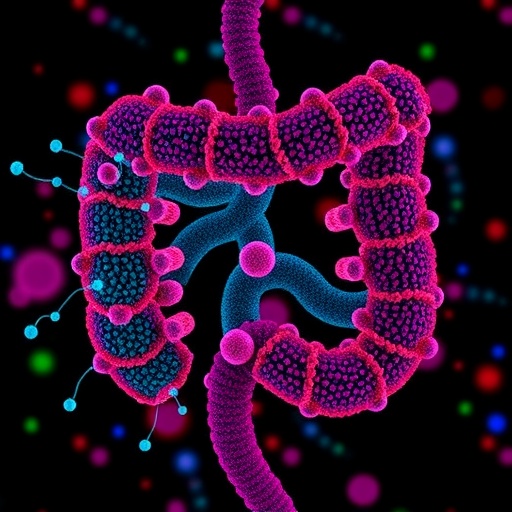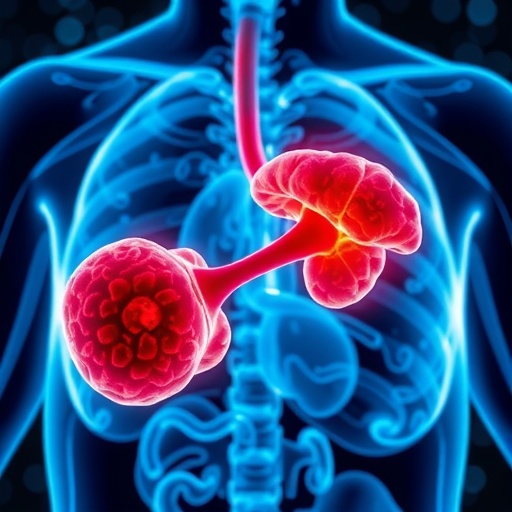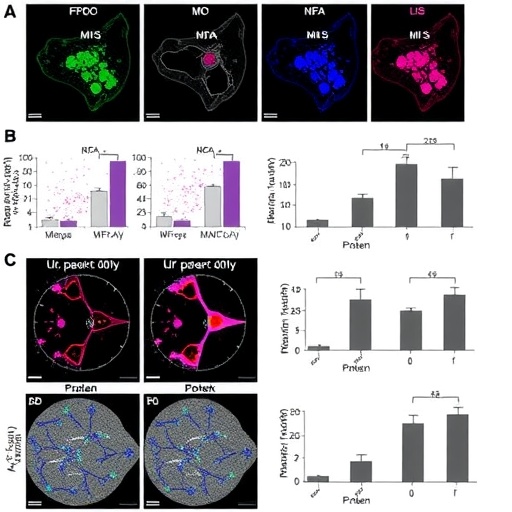
A groundbreaking investigation led by Prof. GU Hongcang and ZHANG Fan from the prestigious Hefei Institutes of Physical Science, part of the Chinese Academy of Sciences, has unveiled a novel regulatory network orchestrated by long non-coding RNAs (lncRNAs) that critically governs colorectal cancer (CRC) progression and shapes tumor immune dynamics. This pioneering study, recently published in Molecular Cancer, offers profound insights into the molecular intricacies of colorectal cancer and suggests compelling avenues for overcoming the persistent challenge of immune resistance, which has hampered immunotherapy efficacy in the majority of CRC patients.
Colorectal cancer represents a formidable clinical challenge due to its extensive genetic and epigenetic heterogeneity, which fosters diverse mechanistic pathways fueling tumor growth and impeding therapeutic interventions. Immune checkpoint inhibitors, heralded as revolutionary cancer therapeutics, have nevertheless demonstrated limited success in CRC, with resistant phenotypes prevalent in approximately 85% of cases. This therapeutic impasse underscores the urgent need to dissect and comprehend the complex molecular networks that modulate tumor immunity and promote immune escape.
To confront this challenge, the research team employed an integrative multi-omics approach, amalgamating transcriptomic, proteomic, and metabolomic datasets derived from CRC tumor specimens alongside matched adjacent normal tissues. This holistic strategy enabled an unprecedented, multidimensional characterization of the molecular aberrations underpinning CRC biology. The analysis identified a staggering number of differentially expressed biomolecules, including 1,394 lncRNAs, 2,788 mRNAs, 548 proteins, and 91 metabolites, highlighting the extensive molecular rewiring occurring within the tumor microenvironment.
By harnessing advanced bioinformatics and network modeling techniques, the researchers distilled these complex datasets into a coherent regulatory network encompassing 22 pivotal lncRNAs, 14 mRNAs/proteins, and 9 metabolites. Within this network, one particular long non-coding RNA, designated lncRNA 60967.1, emerged as a master regulator, exhibiting significant downregulation across colorectal cancer cell lines and clinical tumor samples. This finding singled out lncRNA 60967.1 as a potential linchpin in CRC pathogenesis and immune modulation.
Functional interrogation through experimental restoration of lncRNA 60967.1 expression yielded compelling evidence of its tumor-suppressive capacities. Reinstating lncRNA 60967.1 reactivated the expression of PLCD4, a known tumor suppressor gene implicated in phosphoinositide signaling, and concomitantly elevated intracellular levels of all-trans retinoic acid (ATRA), a metabolite crucial for immune regulation and cellular differentiation. These molecular events synergistically enhanced interferon gamma (IFN-γ)–induced apoptotic pathways and upregulated the interferon gamma receptor subunit 1 (IFNGR1), thereby sensitizing CRC cells to immune-mediated apoptosis and partially reversing their previously entrenched immune resistance.
Mouse model experiments further substantiated the translational relevance of these findings. Overexpression of lncRNA 60967.1 in vivo promoted robust infiltration of immune effector cells within tumor tissues, a hallmark of effective anti-tumor immunity. Most strikingly, when combined with anti-PD-1 immunotherapy—a treatment that mitigates T-cell exhaustion—the synergistic effect led to pronounced tumor suppression, signifying that modulation of the lncRNA 60967.1–PLCD4–ATRA axis can potentiate existing immunotherapeutic strategies.
This multifaceted study reveals a previously uncharted regulatory axis in colorectal cancer biology, intertwining non-coding RNA regulation, tumor suppressor gene activation, metabolite signaling, and immune landscape remodeling. By elucidating the interplay among lncRNAs, mRNAs/proteins, and metabolites, the research delineates a comprehensive molecular circuitry that governs both tumor proliferation and immune responsiveness. Such insights are poised to accelerate the development of novel therapeutic modalities aimed at dismantling immune resistance mechanisms that currently limit the success of immunotherapies in colorectal cancer.
The revelation of lncRNA 60967.1 as a pivotal modulator opens promising avenues for biomarker development and targeted therapies. Harnessing this lncRNA or its downstream effectors could enable precision medicine approaches that restore immune surveillance and improve patient outcomes. Additionally, the identified network components serve as potential druggable targets, providing a molecular scaffold for the design of combinatorial treatments integrating lncRNA modulation with established immunotherapeutic agents.
From a methodological perspective, the integrative multi-omics framework exemplified by this study represents a powerful paradigm for unraveling the multifactorial nature of cancer and other complex diseases. By simultaneously capturing transcriptional, proteomic, and metabolic alterations, researchers can construct holistic models that yield actionable biological hypotheses far beyond the reach of single-omics analyses.
In light of the clinical implications, the discovery that lncRNA 60967.1 restoration enhances IFN-γ pathway signaling is particularly significant, given the central role of interferon pathways in orchestrating anti-tumor immunity. The upregulation of IFNGR1 suggests that modulating this axis could sensitize resistant tumors to immune checkpoint blockade, addressing a critical unmet need in current CRC therapy.
Overall, this study not only advances our understanding of CRC molecular pathogenesis but also charts a strategic path toward overcoming immunotherapy resistance through lncRNA-centered interventions. The fusion of high-resolution omics technologies with functional validation embodies the next frontier in cancer research, setting the stage for innovative treatments that leverage the tumor’s own molecular vulnerabilities against itself.
Subject of Research: Colorectal cancer, long non-coding RNA regulation, tumor immune resistance, multi-omics analysis
Article Title: Integrative multi-omics analysis reveals the LncRNA 60967.1–PLCD4–ATRA axis as a key regulator of colorectal cancer progression and immune response
News Publication Date: 6-Jun-2025
Web References: http://dx.doi.org/10.1186/s12943-025-02359-x
Image Credits: ZHAO Ningning
Keywords: Physical sciences
Tags: cancer immunotherapy efficacy issuescolorectal cancer progression mechanismsgenetic and epigenetic heterogeneity in colorectal cancerimmune resistance in CRCinsights from molecular cancer researchintegrative transcriptomic proteomic metabolomic studylong non-coding RNAs in tumor immunitymulti-omics analysis in colorectal cancernovel regulatory networks in colorectal cancerovercoming immunotherapy resistance in CRCtherapeutic challenges in colorectal cancer treatmenttumor-immune dynamics in cancer




